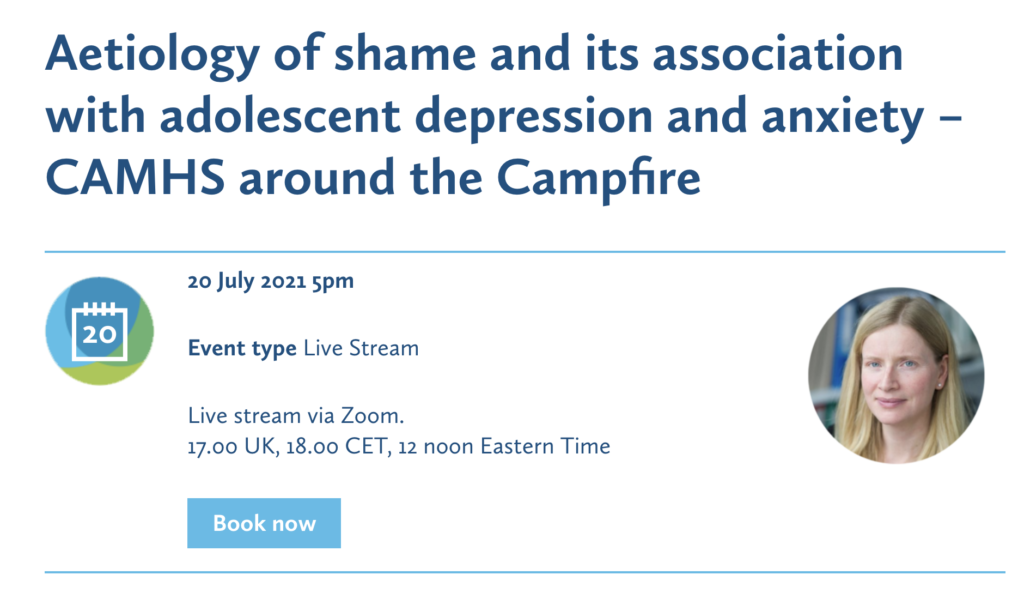
Heightened self-awareness and self-evaluation are hallmarks of the adolescent life stage. These thought processes can become problematic, however.
Consistent, widespread and unfounded negative self-attribution, or shame, is associated with depressive and anxiety symptoms in childhood and adolescence. There is also some evidence to suggest that shame predicts the subsequent development of depression in adolescence. Some authors have interpreted this to mean that shame could be a treatment target to prevent suicide.
- But what causes shame?
- Does it interact with other forms of mental distress?
- When does it become problematic?
- Can we improve mental health by helping young people to overcome or cope with feelings of shame?

Can we improve mental health by helping young people to overcome or cope with feelings of shame?
Methods
The data in this study comes from the Genesis 1219 longitudinal cohort study of twins and non-twin siblings. This study aims to investigate the interplay of genetic and environmental influences on the development of emotional and behavioural difficulties.
Population
Adults registered with GENESiS 1219 who had indicated they had children were contacted and invited to participate. Twins were recruited from a separate source, in collaboration with the UK Office of National Statistics.
- Children aged 12-19, with a mean age of 15, completed assessments of shame, anxiety and depression
- Initial data were captured at “Time 1” of the Genesis 1219 study in 2001-2. Shame was measured at this point only
- Depression and anxiety were measured then at the end, “Time 2”, in 2003-4.
Outcome measures
- Shame: an adjusted version of the Experience of Shame Scale
- Depression: Mood and Feelings Questionnaire (MFQ), using a cut-off of >8 points as “clinically significant”
- Anxiety: Spence Children’s Anxiety Scale (SCAS), using a cut-off of >33 for boys and >40 for girls.
Various analyses were undertaken to investigate how the measures were correlated with one another to yield estimates of which factors were most influential.
Results
2,685 adolescents participated at Time 1. 1,618 provided follow-up data at Time 2 (a 60% follow-up rate). The breakdown of participants was as follows:
| Participant numbers | Monozygotic twins | Dizygotic twins | Unknown twins | Siblings | Total |
| Time 1 | 616 | 1,241 | 185 | 643 | 2,685 |
| Time 2 | 373 | 792 | 123 | 330 | 1,618 |
At Time 1:
- Shame was correlated with anxiety and depression scores
- The twin data showed that shame was “moderately heritable” but with substantial environmental influences.
At Time 2:
- The depression score at time 1 was a stronger predictor of later depression score (time 2) than shame
- The same was true for anxiety scores
- Shame at Time 1 was moderately correlated with depression at Time 2 and weakly correlated with anxiety
- The twin data suggested that the influence of shame on later depression was mostly environmental and not genetic.
Similar results were found when they repeated the analysis using the binary cutoffs for “clinically significant” depression or anxiety, rather than the continuous scores.

These results suggest that shame was moderately to strongly associated with concurrent depression and anxiety.
Strengths and limitations
- Longitudinal cohort studies are most useful for identifying correlations, but cannot usually prove causation.
- These are large samples for this type of study.
- The method for assessing shame was modified from the original, validated measure, using half the number of questions (12 compared with 25 in the original instrument). Although the researchers did not fully validate this adjusted method, they did measure internal consistency, which suggests the adjusted measure is probably valid.
- The GENESiS 1219 study assessed a huge array of measures (see Table 1, McAdams 2013) with many dozens of publications produced from the data. The more measures we make, the most likely it is we will draw “false positive” conclusions that are due to chance rather than correlation. This is more likely to happen when we interrogate a data set retrospectively. In this respect, it is helpful to see the shame findings in the context of the other associations identified by the study.
- There may be volunteer bias in the two different sources of participants.
- Shame was not measured at the end point. This limits what we can say about how it interacts with depression or anxiety.
- The follow-up rate was 60%, which introduces the potential for substantial attrition bias.
- It feels like there are too many concerns around reliability to be 100% sure that these findings represent real life, so more studies are needed, particularly to investigate whether shame can be a treatment target for preventing depression or anxiety.

More studies are needed to investigate whether shame can be a treatment target for preventing depression or anxiety.
Conclusions
There are important caveats around the study methods, outlined above. Although this type of study cannot prove causation, it opens important avenues for future research and may have implications for practice.
The findings are consistent with previous evidence showing that feelings of shame are linked to symptoms of depression and (to a lesser extent) anxiety, both when measured at the same time, and 2 years later. Therapists should be aware that shame could be important to explore with adolescents presenting with depression and anxiety, given that, by its nature, shame may be hidden. Compassion-focused approaches may be useful to explore where shame is part of the presenting problems.
Because this study included both twins and singletons, we can see from the findings that both genes and environmental factors exert an influence on the experience of shame in adolescence. The results suggest that the association between shame and subsequent depression is mostly mediated by environmental factors and not genetic ones. This is important clinically as it suggests that by addressing shame, we may be able to mitigate the risk of subsequently developing depression, although more research is needed to test this hypothesis in practice.

Therapists should be aware that shame could be important to explore with adolescents presenting with depression and anxiety, given that, by its nature, shame may be hidden. Compassion-focused approaches may be useful to explore where shame is part of the presenting problems.
Conflicts of interest
None.
#CAMHScampfire
Join us around the campfire to discuss this paper
The elves are organising an online journal club to discuss this paper with the author Professor Thalia Eley, an independent expert (Dr Maria Loades), a young person and our good friends at ACAMH (the Association of Child and Adolescent Mental Health). We will discuss the research and its implications. The webinar will be facilitated by André Tomlin (@Mental_Elf).
The focus will be on critical appraisal of the research and implications for practice. Primarily targeted at CAMHS practitioners, and researchers, ‘CAMHS around the Campfire’ will be publicly accessible, free to attend, and relevant to a wider audience.
It’s taking place at 5-6pm BST onTuesday 20th July and you can sign up for free on the ACAMH website or follow the conversation at #CAMHScampfire. See you there!
Links
Primary paper
Nikolić M, Hannigan LJ, Krebs G, Sterne A, Gregory AM and Eley TC. (2021) Aetiology of shame and its association with adolescent depression and anxiety: results from a prospective twin and sibling study. JCPP 2021, DOI 10.111/jcpp13465
Other references
McAdams TA, Gregory AM, Rowe R, Zavos HM, Barclay NL, Lau JYF, Maughan B, Eley T. (2013) The Genesis 12-19 (G1219) Study: A Twin and Sibling Study of Gene-Environment Interplay and Adolescent Development in the UK. Twin Research and Human Genetics 2013; 16(1):134-43

